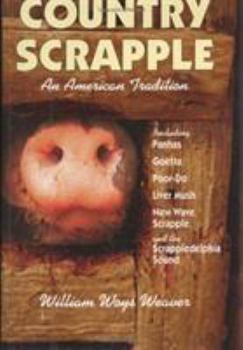Country Scrapple: An American Tradition
The original purpose of scrapple was to make use of leftovers from butchering, but today it is a regional favourite in Philadelphia, Pennsylvania Dutch Country, and, in varying forms and names,... This description may be from another edition of this product.
Format:Hardcover
Language:English
ISBN:081170064X
ISBN13:9780811700641
Release Date:January 2003
Publisher:Stackpole Books
Length:162 Pages
Weight:0.95 lbs.
Dimensions:0.8" x 6.3" x 9.2"
Customer Reviews
4 ratings
Great job, my family was "tickled to death"
Published by Thriftbooks.com User , 15 years ago
Scrapple is an important part of my cultural heritage from the Chesapeake Bay, and I intend on making scrapple for my children. Luckily, my family still makes huge batches of it every year. This book probably won't make them change their recipe, but they loved reading the history of scrapple. As Americans, these are the foodways that we must document, and congrats to the author for having the foresight.
A Culinary Treatise of the First Water. Buy It.
Published by Thriftbooks.com User , 18 years ago
`Country Scrapple, An American Tradition' by the esteemed culinary writer, William Woys Weaver is the kind of book which every major food technique deserves to have written about it. It glorifies a humble, truly American product with scholarship and a respect rarely seen outside the rarefied worlds of wine and cheese writing. This should come as no surprise to anyone who has read Weaver's best known book, `Sauerkraut Yankees' on the more general subject of Pennsylvania Dutch culinary traditions. Weaver has a touch that rivals the very best culinary scholars such as Elizabeth David, John Thorne, and Paula Wolfert. He is the mid-Atlantic answer to Thorne's New England perspective and the Southern culinary voice so loudly heard from Jim Villas and others. The most revealing statement I found in this book is that scrapple can easily be seen as simply a `black polenta', as two of its most important ingredients are corn meal and a meat stock. To back up this perspective, Weaver begins with the story of scrapple's European beginnings in northern Germany and its strong similarities to another high-falutin' food preparation, liver pate. Unlike polenta and pate', scrapple has never lost its humble associations as a poor man's dish, garnered from the very last remains of hog butchery. Part of the great charm in my reading this book lies in the fact that much of the action takes place within a 65 mile radius of my home in Bethlehem, the land of the Moravians, Quakers, Mennonites, and the Amish, and the site of scrapple central, the Reading Terminal Market in Philadelphia. On top of this is the charm and interest of Weaver's linguistic research, citing one of my major personal heroes, the bard of Baltimore, H. L. Menchen. This is also a clue to the fact that scrapple, under several other names, has a much broader range than southeastern Pennsylvania. It has also gone under the name of Panhas, Pon-hoss, and Panhaus in the lands beyond Lancaster County and while grits has entered the pantheon of classic American foods, scrapple and its close relatives such as Pashofa have been a staple of low-cost eating in the south for as long as hogs have been raised and slaughtered there. The book is so rich in detail that I even picked up an obscure fact about hog butchery in that the pig's viscera are actually divided into `haslet'; the heart, lungs and liver and `offal', everything else in the viscera. This is probably not arbitrary, as the heart, lungs and liver are probably the three most blood rich organs, and blood is a common ingredient in many types of German sausage, of which scrapple is a close relative. About half of this book is dedicated to this scholarly introduction. The second half is dedicated to recipes for cooking and making scrapple. Being a native of the Pennsylvania Dutch outskirts and a fairly able home cook, one would think that knowing the right technique for cooking scrapple is in my genes. It isn't. I follow James Beard's recipe whenever I m
Mmmm, I loves me some tasty scraps of pigs!
Published by Thriftbooks.com User , 18 years ago
I once heard someone describe scrapple as "scraps of pigs." Sure, that may sound disgusting to some people, but if you haven't tried scrapple than you really don't know what you're missing out on. It's great stuff! Honestly, I don't know the first thing about this book I'm reviewing - but I sure know scrapple. Any book about scrapple is okay in my book (not that I have my own book, but I think you know what I mean.) Viva Le Scrapple!
A lively, easy read
Published by Thriftbooks.com User , 19 years ago
Whether the reader has had Philadelphia scrapple once, twice or never, Country Scrapple's survey of an American tradition and its history and recipes is unparalleled in the cookbook world. Food historian William Woys Weaver provides a surprising look at the long and European-rooted foundations of Scrapple, adding a wide variety of Scrapple recipes from around the world. Fans of American culinary traditions and history will find Country Scrapple a lively, easy read which is nicely supplemented with excellent dishes.




